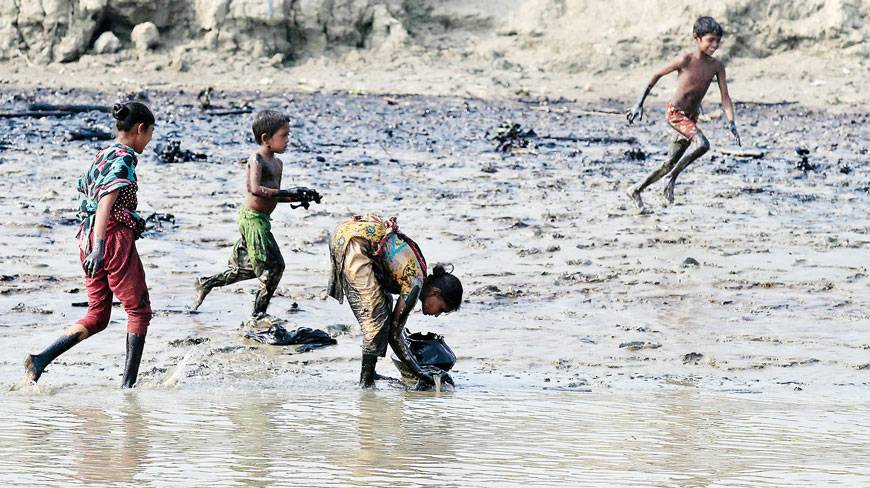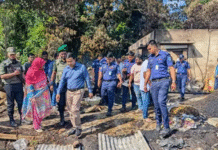
Inability, inexperience, helplessness and lack of far-sight of the authorities are becoming clearer every passing minute, with very little done so far in tackling the environmental disaster that is already happening in the Sundarbans.
Around 11am yesterday, more than two days after the Southern Star 7 sunk in Sela River in the Sundarbans, the rescue ship hired by the owner salvaged the distressed oil tanker under the supervision of the navy.
BIWTA salvage vessel Nirveek reached the spot of the capsize after the hired ship finished the rescue operation.
But, by the time Southern Star 7 was pulled out of water, more than two-thirds of the 357,664 litres of furnace oil had already spread over an 80km-area in the Sundarbans, officials said.
Moreover, divers are still looking for Mokhlesur Rahman, 50, shipmaster of the sunken ship, who went missing during the capsize.
However, as of last night, the authorities did not have any concrete plan to remove the oil that has already had visible adverse impacts on the environment.
They had two options. First, the oil could have been neutralised by spreading chemical dispersant, which navy’s ship Kandari 10 has already carried to the area. But the Forest Department has objected saying the chemical might harm the wildlife and vegetation. So navy, who was ready to start spreading the chemical power last evening, could not start. Mongla port authorities said they would sit in another meeting soon to make a decision in this regard.
Second, oil-consuming bacteria could be spread over the oil. That is an organic way and is a lot less likely to harm the environment than the chemical dispersant. But, it would be a lengthy and highly expensive process because the bacteria will have to be imported.
Instead, following an “emergency” meeting among several authorities, the local people have been asked to manually collect as much of the furnace oil as possible from the water surface.
Furnace oil – which comes in concentrated semi-solid chunks – is different from other types of fuel oil. So, people can collect it using bucket-like containers or trapping it in clothes because this oil also does not get mixed with water.
Padma Oil Company, owner of the spilled oil, yesterday announced that they would buy the oil collected by the local people at Tk4,000 per 220 litres.
However, a few years ago, a similar thing happened in the Bishkali River in Borguna district. An oil tanker, containing only a few hundred litres of oil, capsized in the river. It took local people several days to collect all the oil from the water.
However, nobody has been able to say for certain how many days would it take for the local people in the Sundarbans to collect that much oil, which has already reached Mongla and Poshur River in the downstream and at least 20km in the upstream and travelled to some of the remotest parts of the deep forest via the connecting canals in 72 hours.
After the meeting yesterday, the authorities started encouraging local people using loudspeakers to collect as much oil as they can.
Yesterday, this correspondent saw people, living in Joymonir Gol on the banks of Sela River some 7km away from the spot of the capsize, collecting chunks of floating furnace oil. While some said they were going to use the oil themselves, others said they would sell it.
In 2008, oil spill from a crack in the pipeline of global oil company Shell, at least 1,000 hectares of mangrove forest has been destroyed in the Niger Delta in Africa. Moreover, another 5,000 hectares of forest and more than 30,000 people were badly affected.
Traffic on Sela banned
Bangladesh Inland Water Transport Authority (BIWTA) yesterday suspended movement of all kinds of commercial vessels through the Sela River until further notice, said its Chairman Khandaker Shamsudoha.
The authority has suggested all vessels to take the alternate Mongla-Kokilmoni-Akram route to enter the Bay of Bengal, he said.
When asked whether they would open the Sela River route again after clearing the oil, he said: “Of course, why not?”
However, when asked what if another similar accident happened again, he said: “The alternate route that we have suggested is much longer. If the owners of the vessels are comfortable using that route. Then we might keep the Sela River route closed.”
Dolphins invisible
Talking to local Forest Department official Abul Kalam Azad, our Khulna correspondent reports that dolphins have already become rare.
“We used to frequently see dolphins whenever we stood on the jetty. But we do not see them now. May be they have left the area…These marine creatures are very sensitive. Sensing danger, they might have fled the area…We need more time to be sure about the extent of damage. Even if marine creatures die from the contamination, their dead bodies would take a few more days to start coming to surface. Similarly, we will need more time to be able to say how far the vegetation is damaged,” Azad told our correspondent.
DU Professor and political ecology researcher Tanzim Uddin Khan told the Dhaka Tribune: “These waters now surely do not have enough oxygen for dolphins to breathe. Three things may have happened. Either the dolphins have choked to death, or they have travelled upstream into deeper forest, or they have swam downstream towards the sea.
“The waterways upstream are very shallow and so are not suitable for these dolphins. On the other hand, the further they move downstream, the waters keeps getting more saline, which is also not an option for these sweet and brackish water dolphins. So, it is hard to say right now what has happened to them,” Tanzim said.
India on alert
The oil spill has sent a chill down the spine of wildlife officials in India. A high alert has been sounded and forest officials, along with other security agencies, have been closely monitoring the situation in the Sundarbans.
“Until now there has been no reports that the oil spill has reached the Indian part of the Sundarbans. All our field staffs, particularly those deployed in the camps along the Indo-Bangla border, have been alerted. Patrolling has been beefed up to check if the oil spill is spreading to the Indian Sundarbans,” Ujjwal Kumar Bhattachariya, chief wildlife warden of West Bengal, told the Hindustan Times.
However, Indian forest officials are hopeful that the spill will not affect the Indian side as each individual river drains into the sea.
Source: Dhaka Tribune










So far I know , concerned authorieties should immediatelly rush to the spot of sunken oil tanker in the sundarban with oil skimmer.This appears to be the first step.